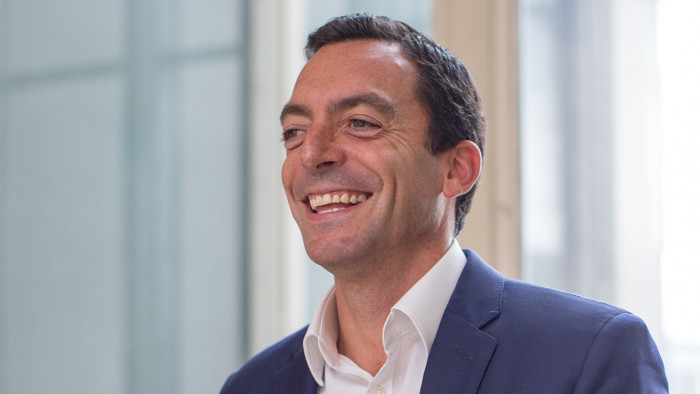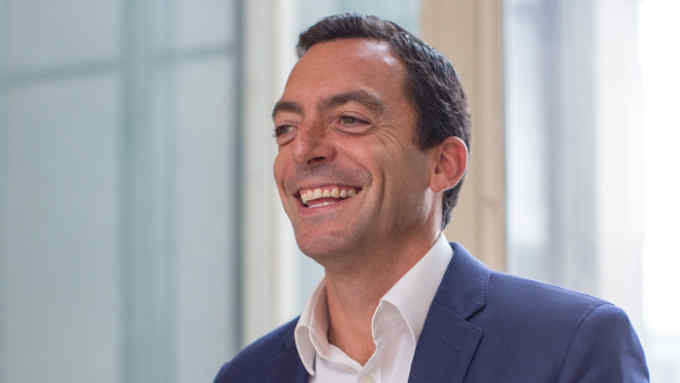‘Overhyped’ 3G offers cautionary note ahead of 5G rollout

Roula Khalaf, Editor of the FT, selects her favourite stories in this weekly newsletter.
Marc Allera has been at the coal face of UK telecoms for three generations of network launches, having helped usher in the modern era of connectivity.
He was chief commercial officer at Three when it was the first company to launch a 3G network in Britain in 2003. He held the same role at EE when it became the first British telecoms company to launch 4G in 2012.
Now, as chief executive of BT’s consumer arm, he wants to complete his hat-trick by being the first to hit the button on faster 5G networks.
To that end, BT — through the EE mobile phone network it now owns — will launch a live 5G trial in October, stretching from the Shoreditch area of London to St Paul’s where the company is headquartered.
The trial aims to connect five small businesses and five homes to wireless broadband speeds of more than 1Gbps — the “gigabit speeds” that the vast majority of broadband users will have to wait years to receive — as EE battles Vodafone, Three and O2 to be first past the post.
Mr Allera argues that the trials, a big step forward, would make sure that the “UK is at the front of the pack for 5G technology” and that it would make the benefits of the technology “a reality”.
The sale of spectrum, the airwaves used to carry mobile signals, in April has paved the way for the UK’s four mobile phone companies to launch 5G. The £302.6m paid by BT came at a tough time for the company, which has struggled to recover since an accounting scandal at its Italian division triggered a series of events that has halved the company’s share price.
This coincided with EE being formally absorbed into BT, which paid £12.5bn for the mobile phone company in 2016 before it fell on hard times. Mr Allera was subsequently promoted to run the combined EE and BT consumer division which has a presence in more than half the country’s homes.
He believes he needs to instil a sense of “positive pressure” to help get the company back on track. 5G could thus act as a catalyst for BT’s recovery. Mr Allera has overseen a new strategy to bring the fixed and mobile networks together.
“Some of the events have made that more important. It doesn’t change our view. We are preparing both fixed and mobile for a 5G future,” he says.
Questions remain over 5G and what the “use case” is for the new technology. Mr Allera argues that despite our addiction to smartphones, previous network launches prove that you cannot take anything for granted.
“3G technology was overhyped, the price was overhyped and the consumer was underwhelmed by the experience,” he says. “That said, we learnt some valuable lessons, and opened people’s eyes to doing more on their mobile. 3G taught us a lesson in financial prudence while 4G taught us how to deploy rapidly at scale.”
The re-release of old-fashioned Nokia phones on 2G networks with nothing more complicated than the Snake game on them suggests there may be some consumer apathy about next-generation mobile services. Yet Mr Allera believes consumers want more connections and 5G could deliver a network capable of delivering on those expectations.
“3G opened people’s eyes to a mobile world beyond voice and messaging, but it wasn’t until 4G that the taps were really opened: data growth took off as the applications emerged, and the performance of 4G fuelled the need to be connected.
“I think with 5G we’ll see this expectation for total connectivity, delivered with a far more intelligent network navigating across fixed, mobile and WiFi, to form a single smart network,” he says.
The telecoms industry also has to move beyond the marketing message that the upgrade just means faster data downloads. “5G isn’t really about speed,” he says, arguing that for the early adopters, it will be about capacity and the ability to target it at the areas most in need, something that was more difficult in the 3G and 4G era. “I’m expecting 5G will see networks transition to being software-defined and cloud-based. This will make them more adaptable, scalable, responsive and reliable than ever before.”
The 46-year-old from south-east England found himself at the age of 26 working at John Menzies, a logistics company, when he was tapped to become sales director at video games company Sega. It was there he became addicted to the “buzz of the launch” with the Dreamcast console, which broke sales records in the pre-Xbox and PlayStation era.
Mr Allera then switched to Three for the hard-fought 3G battle. With BT, he hopes it can lead the way in 5G and put to bed any doubts that the UK is being left behind in the race towards the new network technology.

Comments